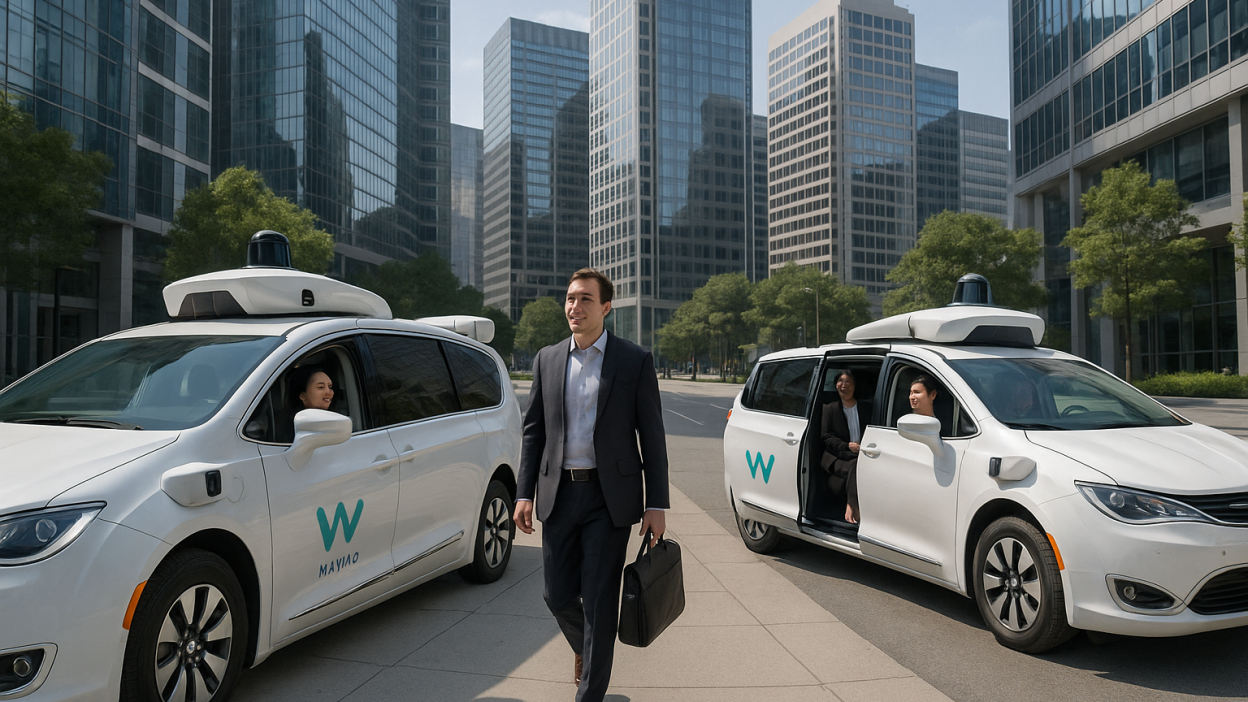Waymo Drives Into the Corporate Travel Market
The corporate travel landscape is on the verge of a significant transformation, and autonomous vehicle pioneer Waymo is positioning itself at the forefront of this shift. For decades, businesses have relied on traditional car services, rideshares, and corporate shuttles to move employees efficiently between offices, airports, and client meetings. However, rising costs, logistical inefficiencies, and environmental concerns have sparked a search for smarter, more sustainable alternatives.
Waymo, a subsidiary of Alphabet, is leveraging its cutting-edge self-driving technology to enter the corporate travel market—a move that could redefine how companies manage employee mobility. The implications are not merely technical; they touch on employee convenience, workplace productivity, cost optimization, and even urban sustainability. By integrating autonomous vehicles into corporate fleets, businesses can envision a future where commuting becomes safer, more reliable, and environmentally responsible.
This initiative also brings a human dimension to the forefront. Corporate travelers spend countless hours navigating traffic, scheduling rides, and coordinating logistics. With Waymo’s autonomous technology, companies could dramatically reduce stress and lost productivity, allowing employees to focus on high-value tasks instead of transit frustrations. Moreover, the broader societal impact—reduced traffic congestion, lower emissions, and enhanced accessibility—positions this move as a potential win-win for businesses, employees, and cities alike.
In this article, we explore Waymo’s entry into the corporate travel sector, examining its strategy, potential market impact, technological advantages, challenges, and the broader implications for businesses and society.
From Consumers to Corporate Clients
Waymo has long been associated with pioneering self-driving technology for consumer ridesharing and logistics. Yet, the company’s expansion into the corporate travel sector marks a deliberate strategic shift. Rather than focusing solely on individual riders, Waymo is now targeting organizations that require reliable, scalable, and cost-effective mobility solutions.
Corporate travel presents unique opportunities. Large companies manage complex travel needs daily, from airport transfers to intercity commuting. By offering autonomous fleets that can be integrated into corporate mobility programs, Waymo provides businesses with predictable travel costs, enhanced safety, and scheduling flexibility. Early partnerships suggest that companies are receptive, especially those in tech, consulting, and finance, where employee travel frequency is high.
This strategic pivot is also a response to market pressures. The global corporate travel market, valued at over $1.3 trillion in 2023, is recovering rapidly from the pandemic downturn, with companies seeking innovative ways to control expenses while maintaining employee satisfaction. Waymo’s autonomous solutions promise a compelling combination of efficiency, reliability, and prestige, giving businesses a technological edge in workforce mobility.
Benefits of Autonomous Corporate Travel
Enhanced Safety and Reliability
Employee safety is a primary concern for corporate travel managers. Autonomous vehicles, equipped with advanced sensors, AI-driven navigation, and real-time monitoring, offer the potential to reduce accidents caused by human error. In corporate fleets, this translates into fewer incidents, lower insurance costs, and greater confidence in employee transportation programs.
Cost Optimization
Traditional corporate travel can be expensive, with costs accumulating from taxis, rideshares, and company-owned vehicles. Waymo’s autonomous fleets allow companies to predict and manage expenses more efficiently. Subscription-based models or pay-per-use plans reduce overhead while providing access to cutting-edge mobility solutions without the need for significant capital investment.
Increased Productivity
Time spent commuting is often wasted, especially when employees navigate traffic or coordinate ride logistics. Autonomous vehicles allow passengers to focus on work, calls, or relaxation during transit. For corporations, this means more productive hours and a potential improvement in employee satisfaction.
Sustainability and Environmental Impact
Many corporations are actively pursuing sustainability goals. Waymo’s autonomous fleet, particularly when electric-powered, supports emission reduction targets by optimizing routes, reducing idle time, and promoting shared rides. Companies can bolster their ESG (Environmental, Social, Governance) credentials while contributing to cleaner urban environments.
Case Studies and Early Implementations
Although Waymo’s corporate travel program is in its early stages, initial pilots offer insights into its potential impact:
-
Tech Company Pilot: A large technology firm integrated Waymo vehicles into its employee airport transfer program. Results indicated a 20% reduction in overall transit costs and a significant increase in employee satisfaction scores.
-
Consulting Firm Partnership: A consulting company leveraged Waymo for client site visits across metropolitan areas. Autonomous vehicles improved punctuality by 15% and reduced coordination time for travel managers.
-
Shared Office Complex: Waymo provided fleet services for a business park, enabling on-demand shuttles for multiple companies. The initiative reduced traffic congestion within the park while lowering emissions.
These examples illustrate that autonomous corporate travel is not a theoretical concept—it is actionable today, with measurable benefits for companies and employees alike.
Technological Advantages Driving Adoption
Waymo’s competitive edge lies in its technological expertise:
-
AI-Powered Navigation: Waymo’s vehicles leverage advanced machine learning algorithms to navigate complex urban environments with minimal human intervention.
-
Sensor Fusion: Lidar, radar, and cameras provide a 360-degree view of surroundings, ensuring safe operations even in unpredictable traffic conditions.
-
Scalability: Waymo’s cloud-based fleet management allows companies to scale vehicle usage based on demand, optimizing efficiency.
-
Integration with Corporate Systems: APIs and fleet dashboards enable seamless scheduling, tracking, and analytics for travel managers.
These technological capabilities position Waymo as not just a rideshare service but a holistic corporate mobility partner.
Challenges and Considerations
Despite the promise, autonomous corporate travel faces several hurdles:
-
Regulatory Landscape: Different cities and states have varying laws regarding autonomous vehicles. Compliance will require ongoing engagement with regulators.
-
Public Perception: Trust in self-driving technology is growing but remains a barrier. Corporate adoption may be influenced by employee comfort and confidence.
-
Infrastructure Requirements: Some cities lack the infrastructure needed to fully support autonomous fleets, including sensor-friendly roads and charging stations for electric vehicles.
-
Cost vs. ROI: While savings are projected, upfront investment in integrating autonomous fleets into corporate travel programs may be substantial for some businesses.
Addressing these challenges will be critical to widespread adoption and long-term success.
Broader Societal Implications
The move into corporate travel is not just a business decision; it carries societal ramifications:
-
Urban Mobility Transformation: Reduced human-driven vehicle reliance can lower traffic congestion and improve road safety.
-
Workplace Productivity Shift: Employees reclaim commuting time for work or wellness activities, potentially improving mental health and job satisfaction.
-
Environmental Benefits: Widespread deployment of electric autonomous fleets contributes to corporate sustainability initiatives and city-wide emissions reductions.
-
Accessibility: Autonomous vehicles can expand mobility options for employees with disabilities or those in areas underserved by public transport.
Waymo’s entry into corporate travel is therefore a microcosm of a broader mobility revolution, demonstrating how autonomous technology can integrate with human-centric societal needs.
Waymo’s strategic entry into the corporate travel market represents a convergence of technology, business efficiency, and societal impact. By providing safe, reliable, and sustainable mobility solutions, Waymo is poised to reshape how companies manage employee travel. Beyond cost savings and productivity gains, autonomous corporate fleets promise broader benefits: improved safety, reduced environmental impact, and enhanced employee experience.
While challenges remain—regulatory hurdles, public perception, and infrastructure requirements—the trajectory is clear. Autonomous corporate travel is no longer a distant vision; it is becoming a tangible, actionable reality. For companies willing to embrace innovation, Waymo offers not just transportation but a pathway toward a smarter, safer, and more sustainable future of corporate mobility.
FAQs
Q1: What is Waymo’s corporate travel initiative?
Waymo provides autonomous vehicles tailored for corporate use, including employee transfers, client visits, and interoffice commuting.
Q2: How do companies benefit from Waymo’s services?
Benefits include cost savings, increased employee productivity, improved safety, and reduced environmental impact.
Q3: Are Waymo vehicles safe for corporate passengers?
Yes, Waymo vehicles use advanced AI, Lidar, radar, and cameras for safe navigation in complex environments.
Q4: Which industries are adopting Waymo’s corporate travel solutions?
Tech firms, consulting companies, business parks, and other organizations with frequent employee travel are early adopters.
Q5: What are the challenges of integrating autonomous fleets?
Regulatory compliance, infrastructure needs, public perception, and upfront integration costs are key considerations.
Q6: How does autonomous travel impact sustainability?
Electric autonomous fleets reduce emissions, optimize routes, and lower traffic congestion, supporting corporate ESG goals.
Q7: Is Waymo’s service available nationwide?
Currently, availability is focused in select metropolitan areas, with gradual expansion as regulations and infrastructure evolve.
Stay informed about the future of mobility and autonomous technology. Subscribe to our newsletter for the latest insights on AI, corporate innovation, and smart transportation solutions.
Note: Logos and brand names are the property of their respective owners. This image is for illustrative purposes only and does not imply endorsement by the mentioned companies.



